Managing a franchise SEO strategy requires a firm grasp of the fundamentals of SEO and the tools to reproduce those strategies at scale.
There are many challenges that face franchise owners attempting to rank businesses across multiple locations, but using proven local SEO tactics can provide a solid foundation on which to build future campaigns.
What is franchise SEO?
Franchise SEO is the broad term given to a number of strategies and tactics used to improve search visibility for franchise businesses.
This can include the use of local SEO tactics to rank individual franchises, as well as content creation to rank a local franchise opportunity website aimed at onboarding new franchisees.
Creating a successful SEO campaign for a franchise business requires a holistic approach as content must be managed across a multitude of platforms. This includes the franchises’ website, social media, Google My Business (GMB) and any other 3rd party review platforms being used.
Depending on the size of the franchise business this could mean empowering franchisees to make updates to their own profiles or centralising the responsibility to a marketing agency or internal manager, or even the master franchisee.
Can I do SEO on my own?
You can do some SEO successfully yourself. While anyone can learn SEO fundamentals; establishing, maintaining and adapting a successful SEO strategy requires frequent updates, advanced SEO tools and a deep knowledge of SEO best practices.
Why is franchise SEO important?
Franchise SEO is an important aspect of marketing a franchise business. Whilst traditional marketing channels may still perform well, SEO for franchise websites puts brands in front of people who are actively searching for franchise opportunities or the services of the business itself.
Improved rankings for franchisees
An ongoing SEO franchise campaign can help drive the visibility and success of individual franchises.
Each franchisee likely competes within their own localised search engine results page (SERP), the better visibility they can achieve, the better their business will do.
Improved search visibility in localised searches across the country has a knock-on effect on the overall franchise business as it improves brand awareness, builds trust and generates enquiries from new prospective franchisees.
Search visibility for the franchise brand
Improving the search visibility of the franchise brand is just as important as ensuring the progress of each individual franchise.
Franchise businesses will naturally compete for visibility amongst commonly searched terms around their niche.
A local franchise SEO strategy will include a content creation plan built around these commonly searched terms (keywords) that are used by prospective franchisees.
By strategically targeting these keywords, franchise businesses can gain the edge over their competition, ensuring their content has the lion’s share of top-ranking search results.
9 essential strategies for improving local SEO for franchises
1. List each of your franchise locations on Google Maps
One of the easiest ways to find a shopfront in 2021 is to search for it on Google. The search engine provides a map of options and lets users get GPS directions to the one of their choosing in a matter of clicks.
If your franchises aren’t yet findable on Google Maps, then what are you waiting for? Get them registered on Google My Business.
Registering for Google My Business is a piece of cake, just visit their website and follow the simple instructions.
The majority of localised service business searches on Google (ie. ‘oven cleaning Liverpool’ or ‘tattoo shop Exeter’) will trigger a localised search result at the top of the page. This will feature a map of the area specified and businesses that are relevant to the search term.
Creating a Google My Business account for each franchise location is a mandatory first step in improving search visibility as 46% of all Google searches are looking for local information
It’s also one of the cheapest and easiest franchise SEO strategies around.
You’ll want to be sure to optimise each local franchise profile by adding contact information for each branch, images of the location, and local business hours.
Whatever information Google asks for, make sure that you continually fill it in to the best of your ability as the more you update your GMB, the more visibility you will get.
2. List each of your franchise locations on Yelp
When searchers aren’t using Google to find a well-rated business, they often turn to Yelp to view review scores as Yelp, alongside Google My Business, is one of the most popular and well-trusted 3rd party review sites.
Registering franchise locations on Yelp gives customers the opportunity to share their experiences and can improve trust with those researching their options.
This can greatly strengthen your local franchises SEO and conversion rates as one study by Harvard Business School found that a one-star increase in Yelp rating leads to a 5-9 percent increase in revenue.
Not listing each of your franchise locations on Yelp could mean you miss out on potential customers, many of whom are already in your area and searching for your products or services.
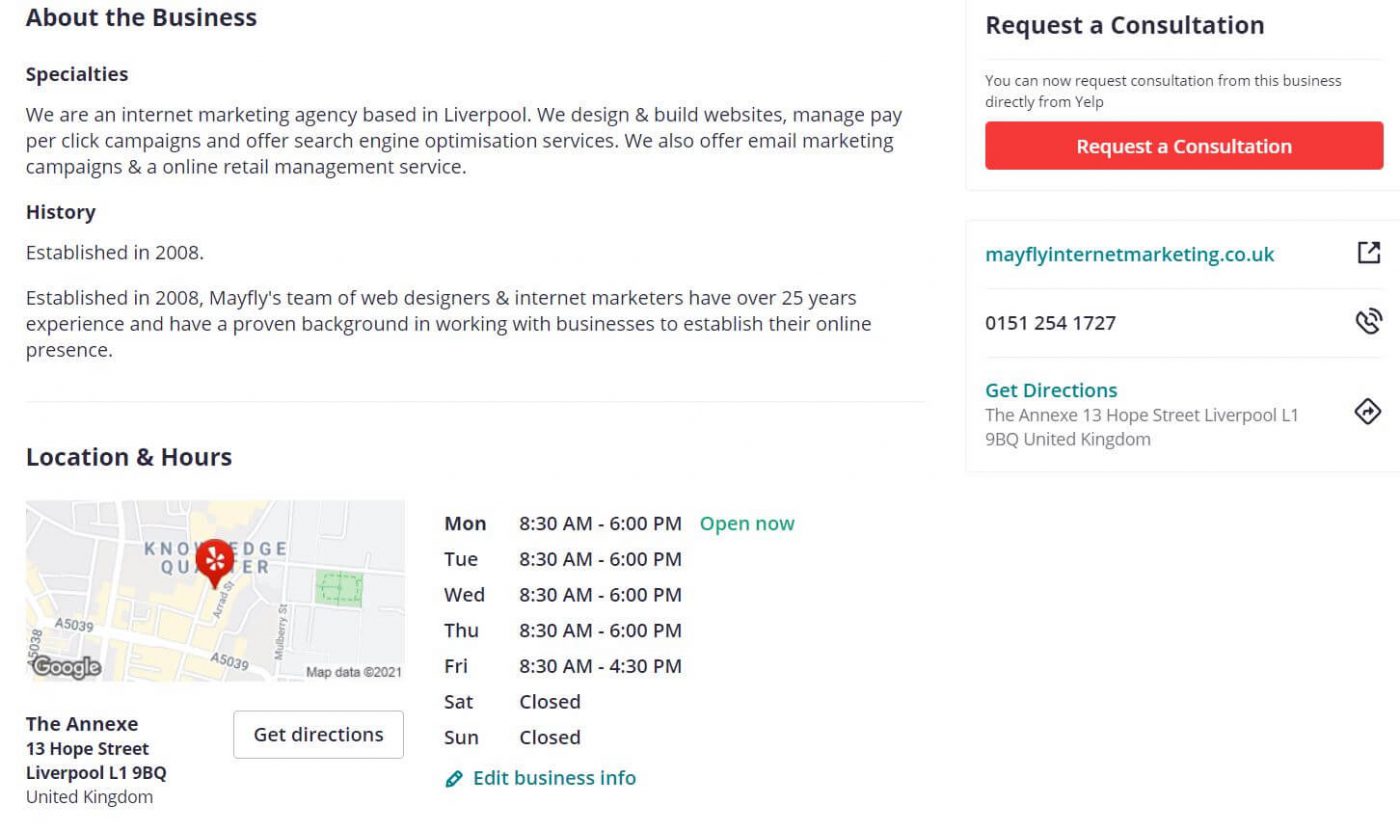
If someone searches for your franchise in Liverpool, but you only have a Yelp page for a location in Cardiff, they’re not going to consider you as an option.
Having Yelp pages for each franchise location allows users to review each location, thereby benefiting local audiences.
They’ll also be able to learn exactly what local customers liked and disliked about a particular franchise location, and share accurate photos of your shopfront and products.
93% of customers read online reviews before buying a product, so having a clear, comprehensive, and friendly Yelp page will likely improve conversions as well as local SEO for franchises.
3. EMPLOY A ONE-SITE FRANCHISE SEO STRATEGY
When it comes to creating websites for franchises, there are typically two separate options for you to choose from.
The first is to bunch all franchises together on one site.
For example:
www.companyname.com
www.companyname.com/locations
www.companyname.com/location/city
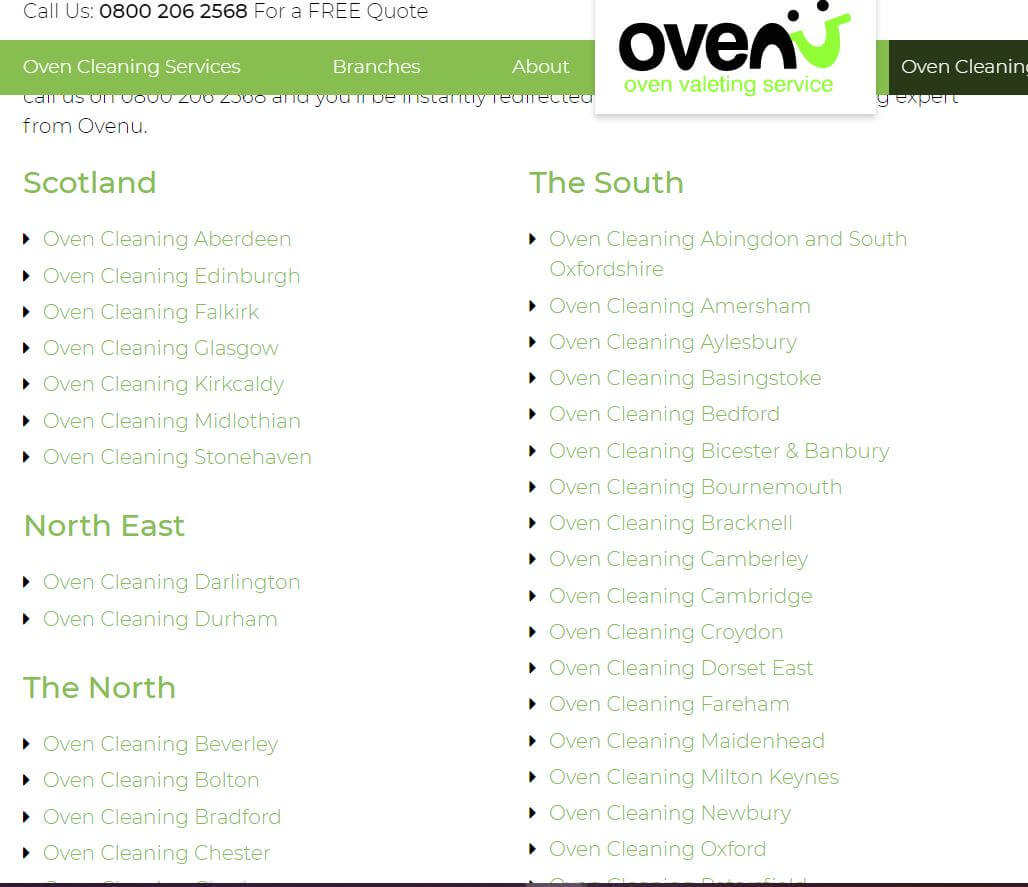
This method is going to provide your website with the most link equity, or ‘link juice’.
The second franchise SEO option is to create microsites for each location.
While it may seem like this is franchise SEO best practice, creating microsites for each location is very costly.
In some cases, you can get good results when applying franchise SEO tactics to individual websites.
However, we here at Mayfly, prefer option one. When we do SEO for franchise websites, we predominantly recommend this option because it usually makes sense for them from a business perspective.
The entirety of a franchise business’ operations should generally always be confined to one website, as opposed to split up across a number of domains.
This benefits both user experience and also makes the franchise business easier to understand from Google’s perspective.
Focusing local SEO efforts for multiple locations on one website ensures that all authority accrued by the franchise brand is equally attributed to its individual franchise locations.
4. CREATE CUSTOMISED LOCAL FRANCHISE LANDING PAGES
The goal of a customised franchise landing page should be to distinguish that location from all the others.
To implement franchise SEO best practices for your landing page:
- Make your call to action (CTA) prominent and locally relevant.
- Provide links to your individual franchise pages.
- Manifest a range of high volume, low competition relevant keywords into your content.
- Add high-quality imagery with keyword-rich Alt text.
- Include franchise location keywords within your headings.
- Point internal links to your franchise landing page using keyword-rich anchor text.
- Create unique content that provides significant value to users, rather than regurgitating content from other landing pages.
- Keep your company name, address, and phone number (NAP) consistent with all other online citations for that location.
All franchise locations should have local landing pages on the franchise brand’s website.
We helped one of our largest franchise clients experience a 90%-year-on-year increase in organic traffic using these very tactics.
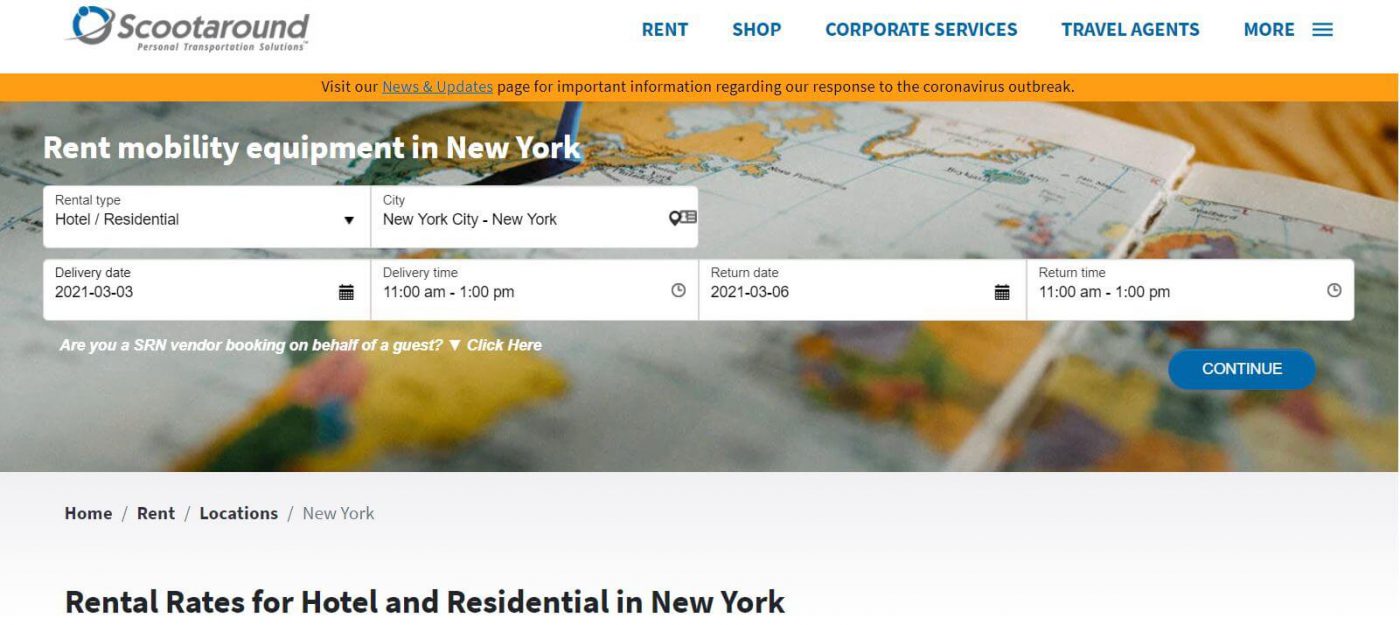
These pages serve as the franchisee’s main web presence (besides social media) and should be linked to from their GMB and Yelp listings.
The local landing page is a franchise SEO opportunity as it forms a base to publish location-specific content on and can leverage the franchisee’s relationship to the area for added authenticity.
5. USE LOCATION-BASED KEYWORDS IN YOUR WEBSITE CONTENT
Using location-based keywords throughout a franchise website is key to ranking for those all-important localised searches.
Local landing pages should have highly optimised titles featuring the top-level keyword that each franchise is aiming to rank for.
Each local landing page should then be linked to either from the main navigation or from a location’s parent page using exact match anchor text.
For example, if you’re an Italian restaurant based in Liverpool, you’ll want to include the phrase ‘Italian restaurant in Liverpool’ in important elements like title tags, headings, and body copy.
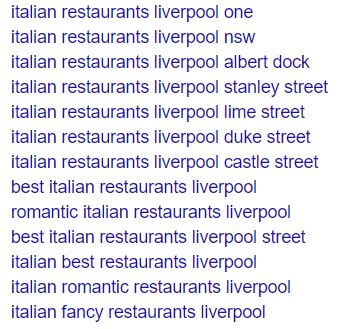
You can also use local landmarks, nearby tourist destinations, and area names as target keywords. So, for example, if someone searches for ‘Italian restaurants Liverpool Lime Street’, your business can show up in search results.
6. ENCOURAGE CUSTOMERS TO LEAVE REVIEWS FOR DIFFERENT LOCATIONS
Online reviews are the bread and butter of online reputation. So much so that 84% of people trust online reviews as much as personal recommendations.
With that in mind, if your shopfront doesn’t have any reviews, potential customers are going to be extremely hesitant to enlist your services as 72% of customers won’t take any buying actions until they’ve read reviews.
The quantity and overall rating of reviews on a franchise’s Google My Business listing will directly impact its ranking in the map pack.
This is why it’s crucial to have a review collection system in place, whether this is prompting customers to review after a purchase in-store, or sending a follow-up email after a service has been completed or an invoice paid.
Of course, there are plenty of tools that can help you scale and accelerate the review collection process too. Ciarán Ó Muiris, an SEO consultant at Mayfly, has hands-on experience helping franchises achieve this in a variety of ways, including through Gatherup integration.
Of course, there are many other similar tools out there, so it’s best to do your research to find a solution that suits your needs best. If you’re running a multi-location franchise SEO operation, for example, chances are you need to do things at scale, so a review management tool is probably best suited for you.
All reviews should be responded to, with particular care paid to neutral or negative reviews. Google even encourages this in their own documentation and hints at it being a ranking signal.
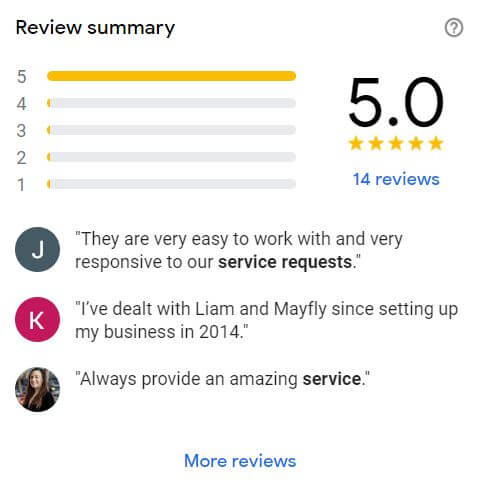
7. ADD LOCATION-SPECIFIC SCHEMA FOR EACH LOCATION
Schema, otherwise known as structured data, is definitive information about a page’s content that helps Google better understand and rank websites.
For instance, a product page for an office chair might feature schema markup that includes the chair’s price, inventory status, and the number of reviews.
Whereas a digital marketing agency like ourselves here at Mayfly Internet Marketing, might markup the FAQs featured on our Liverpool Web Design Services page with FAQPage markup.
This essentially gives us some more real estate on the search results page for location-oriented queries such as ‘web design Liverpool‘. This extra real estate helps us stand out from competitors, increasing our click-through rate and traffic as a result.

The LocalBusiness schema markup is a top priority for any web design franchise SEO for businesses with multiple locations. This is because it is a simple and effective way of communicating the most important information about a franchise location to Google.
Other schema markup that could prove useful to a franchise business are aggregateRatings, GeoCoordinates, Product and Price.
With schema markup, search engines such as Google and Bing can rank your content more accurately and appropriately, which can lead to improved rankings.
In some cases, search engines will use that information to create a rich result.

A rich result enhances the real estate of your website in search results. For example, your site may feature stars, product pricing information, and more. This information can entice users to click on your website over a competitor.
Adding structured data to your website will take a lot to technical expertise, so it might be worth soliciting the help of an SEO agency, if you do not have the time or resources to achieve this.
However, Google’s schema markup documentation can make things a little easier, along with their Structured Data Testing Tool to troubleshoot and fix issues.
8. KEEP EACH OF YOUR FRANCHISE LOCATION NAPS IN CHECK
A franchise’s Name, Address and Phone Number (NAP) are the most crucial pieces of information about the business.
It’s vital that this information is kept consistent across every website the business has a presence on.
The NAP for each franchise should be consistent across the location page, social media, review sites and business listings, such as Google My Business.
This consistency is not only useful from a practical perspective but also allows Google to pinpoint exactly what your franchise location is about.
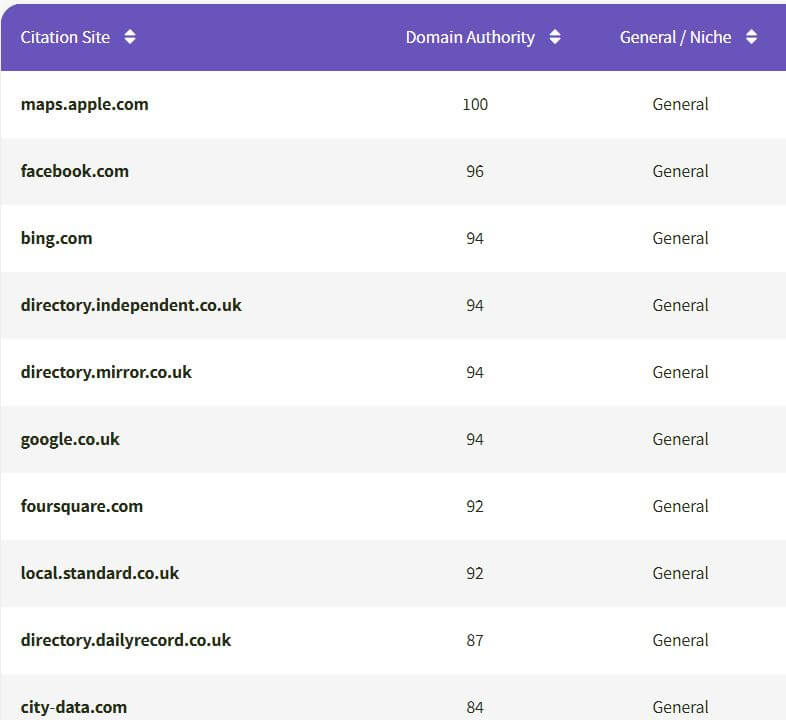
The era of the yellow pages of the phone book has long passed, and these days, businesses list themselves in multiple locations online. This means that you, as a franchisor, have to track your business across multiple physical and online locations.
Yep, this is a major pain in the you-know-what. But there’s more!
If you’re allowing each franchisee to manage their local business listings, you’ll begin to notice minor differences in the way the company’s NAP details are published across multiple listings. And Google is very, very picky about this.
So you’ll want to begin by reclaiming access to as many of these listings as you possibly can.
Reach out to franchisees to stress the importance of keeping NAP information consistent.
Be sure to retain control over such listings in the future, especially if you sell franchises.
The most important thing to remember is that sound franchise SEO strategies start with making sure NAP information for all locations is consistent across all online listings.
Once you have that pencilled off, you’ll want to find as many relevant, useful local directories as you can. You can do so the good old-fashioned way via a simple Google search, or by using a specialist tool such as BrightLocal. (We use this tool here at Mayfly, and don’t earn any commission on saying that!)
Citation management tools such as BrightLocal and Whitespark help you find relevant, local directories where you can list multiple local franchises.
Let’s say you have an oven cleaning franchise in Birmingham. BrightLocal automatically places it in the Birmingham directory.
9. ENSURE THAT YOUR FRANCHISE LOCATIONS SHOW UP ON GPS DEVICES
Your franchise location should be visible on all GPS devices, which means ensuring that each location is registered on GPS Points of Interest databases.
GPS manufacturers (such as Garmin and TomTom) and car manufacturers draw from databases to show users points of interest whilst they’re using their GPS devices.
Submitting franchise locations for approval in these databases makes it that much easier for drivers to find or even stumble across a franchise.

Do be sure to cross-check all listings after using such tools!
FAQS ABOUT LOCAL SEO FOR FRANCHISES
WHAT ARE SOME CHALLENGES WITH FRANCHISE SEO FOR MULTIPLE LOCATIONS?
Delivering an effective franchise SEO campaign for multiple locations comes with its own set of unique challenges.
Franchise websites can span over hundreds of pages, so ensuring each page is properly optimised and has a purpose can be a gargantuan task.
A digital marketing agency that has experience working at this scale can effectively manage the franchise’s SEO effort.
RISK OF DUPLICATE CONTENT
One drawback of optimising SEO for a large-scale franchise website is the potential for creating duplicate content.
When creating multiple local landing pages there is always a risk for large amounts of boilerplate content to be copied across the domain, which isn’t ideal.
Google has spoken out specifically against ‘doorway pages‘ which offer little value to the user and only serve to funnel users through to other content on a website.
The key to combating this is to include useful, unique content on each franchise location page so that each page can stand on its own feet.
COMPETITION FROM LOCAL BUSINESSES
The biggest challenge that any franchise SEO campaign faces is competition from hundreds of other local businesses in the search results pages and map results.
Each localised search results page is different and will be populated with a range of different competitors.
Franchisees may face competition from long-established local businesses, franchisees from competing brands, and independent operations who are likely to be making use of their own SEO tactics to get an advantage.
PRIORITISING SEO FRANCHISE OPPORTUNITIES IN AN SEO STRATEGY
Finally, a core component of any franchise SEO strategy is to build the authority of the franchise brand within its niche.
This is often overlooked in favour of improving rankings for individual franchise locations.
Competing franchise brands are likely to have put resources behind their own SEO campaigns, so competitive analysis and smart strategic planning are key to identifying opportunities and respond accordingly.
WHAT DO LOCAL FRANCHISE SEO SERVICES INCLUDE?
Local franchise SEO services include the usual sub-services provided by an SEO agency, however, these are multiplied when considering the large-scale nature of a Franchise SEO campaign.
NATIONAL KEYWORD AND NICHE RESEARCH
A typical franchise SEO strategy takes into account dozens of franchise locations, the industry niche and the franchise brand’s place within it, in terms of authority, expertise and trust.
A strategy is based on niche and keyword research, taking in all levels of the funnel in order to provide a roadmap that can be tailored to the brand’s needs.
MANAGING GMBS AND CITATIONS
Google My Business listings, review sites, and citations must be carefully managed and audited to ensure NAP consistency across the board for all franchise locations.
In addition to this, some franchise brands may require reputation management to ensure that all reviews are responded to and any negative comments are dealt with swiftly.
TRACKING AND REPORTING PROGRESS
A robust tracking and reporting system must be in place in order to ensure campaign performance can be effectively measured.
Search rankings are constantly in flux, so whilst it might not be beneficial to regularly report on hundreds of different rankings for multiple franchise locations, it can be useful to see the big picture and observe how the franchise SEO campaign has affected overall keyword visibility for the brand.
CONTENT CREATION AND OPTIMISATION
All franchise SEO campaigns will require optimisation of existing content at the very least, this may include adding personal expertise from the brand’s leading voice or including testimonial content from customers or franchisees.
In most cases, franchise websites require complete restructuring in order to separate the service business from the franchise business.
Any franchise brands using micro-sites would require more work to bring content under one domain, which could involve large-scale redirects and content creation.
LOCAL FRANCHISE PAGE DEVELOPMENT
Franchise location pages should be considered constant works in progress.
In order to compete on their own localised SERPs, they will need to be continually audited, so that they can be further developed and improved upon.
In some cases, this may require coordination with the franchisees, so that more value and local expertise can be added to their page.
This may include populating a ‘Meet the Team’ section and working to collect reviews for individual locations.
FRANCHISEE ACQUISITION CONTENT STRATEGY
Franchise opportunity content creation is also a key component of franchise SEO services.
Content targeting niche-related top-of-the-funnel search terms can be used to attract people who are researching their options.
This is also the perfect opportunity to leverage the success of existing franchisees using testimonials, long-form case studies, and reviews from customers to drive home the benefits of signing up.
Resources
https://moz.com/local-seo-guide
https://whitespark.ca/blog/gmb-conversion-factors/
https://blog.hubspot.com/marketing/local-seo-stats
https://support.google.com/business/answer/7091?hl=en-GB
https://www.hbs.edu/faculty/Pages/item.aspx?num=41233
https://www.qualtrics.com/blog/online-review-stats/
https://learn.g2.com/customer-reviews-statistics
https://schema.org/docs/schemas.html
https://support.google.com/business/answer/3038177?hl=en-GB
DOES YOUR FRANCHISE NEED A LOCAL SEO STRATEGY?
Local franchise SEO is one of the best options for franchise brands to improve their visibility in local search results and to attract more prospective franchisees to sign up.
A Franchise SEO strategy is a long-term investment that can reap significant rewards for businesses looking to compete for rankings on the search results pages.
Mayfly Internet Marketing has a proven track record of helping franchise businesses restructure their websites and build high-performing local landing pages.
Our work has helped clients claim hundreds of top 10 rankings in competitive high-volume search results, as well as drive the acquisition of new franchisees.
Get your franchise SEO strategy started today by getting in touch with us. We’ll get to know you and your business before outlining a bespoke strategy that’s tailored to your business goals.
As a full-service Liverpool digital marketing agency, we understand that all sustainably successful SEO strategies require persistent dedication, in-depth analysis, and industry-leading tools to adapt to Google’s ever-changing updates. We also write in-depth articles to help specific sectors level up their SEO efforts, such as our ultimate guide to Hospital SEO.
Championing these core values and resources as a Liverpool SEO agency has enabled us to continually provide our clients with unrivalled Franchise SEO results. So, if you’re looking to boost your traffic and take your franchise to the next level, contact us today for an unbeatable bespoke franchise SEO strategy that’ll take your franchisees to new heights.
Get in touch with us today to find out how we can build an SEO strategy tailored to your franchise’s needs.

